Events/Delegates in VB.NET
(Static/Dynamic declaration, AddressOf/RaiseEvent/AddHandler/WithEvents/Handles statement,
SingleCast/MultiCast/InvocationList, Invoke/BeginInvoke/DynamicInvoke/AsyncInvoke, Automatically instantiate.
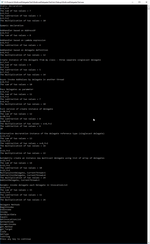
1:
2: Module Module1
3:
4: 'Define a Multicast delegate reference type that takes two integer
5: Public Delegate Sub CalculateTwoValuesDelegate(ByVal x As Integer, ByVal y As Integer)
6:
7: Dim WithEvents MyClassInstance2 As MyMethodClass
8:
9: Sub Main()
10:
11: Console.WriteLine("Static declaration")
12: MyClassInstance2 = New MyMethodClass()
13: MyClassInstance2.AddValues(5, 2)
14: MyClassInstance2.SubtractValues(5, 2)
15: MyClassInstance2.MultiplyValues(5, 2)
16:
17: Console.WriteLine()
18: Console.WriteLine("Dymanic declaration")
19:
20: 'Three version of Adding Handler
21: '-------------------------------
22:
23: 'Define an instance of the class MyMethodClass
24: Dim MyClassInstance As MyMethodClass = New MyMethodClass()
25:
26: '------
27: Console.WriteLine()
28: Console.WriteLine("AddHandler based on AddressOF")
29: AddHandler MyClassInstance.AddCalculateRequest, AddressOf MyClassInstance.Print
30: MyClassInstance.AddValues(6, 2)
31:
32: '------
33: Console.WriteLine()
34: Console.WriteLine("AddHandler based on Lambda expression")
35: AddHandler MyClassInstance.SubtractCalculateRequest, Sub(x, y) Console.WriteLine("x={0:N0},Y={1:N0}", x, y)
36: MyClassInstance.SubtractValues(6, 2)
37:
38: '------
39: Console.WriteLine()
40: Console.WriteLine("AddHandler based on delegate definition")
41: Dim MultiplyEventHandler As MyMethodClass.CalculateRequestEventDelegate = AddressOf MyClassInstance.MultiplyValues
42: AddHandler MyClassInstance.MultiplyCalculateRequest, AddressOf MyClassInstance.Print
43: MyClassInstance.MultiplyValues(6, 2)
44:
45: '------
46: Console.WriteLine()
47: Console.WriteLine("Create Instance of the delegate from my class - three separate singlecast delegate")
48: Dim AddInstDelegate As CalculateTwoValuesDelegate = AddressOf MyClassInstance.AddValues 'Automatically create an instance
49: Dim SubtractInstDelegate As CalculateTwoValuesDelegate = New CalculateTwoValuesDelegate(AddressOf MyClassInstance.SubtractValues)
50: Dim MultiplyInstDelegate As CalculateTwoValuesDelegate = New CalculateTwoValuesDelegate(AddressOf MyClassInstance.MultiplyValues)
51:
52: AddInstDelegate(7, 2)
53: SubtractInstDelegate(7, 2)
54: MultiplyInstDelegate(7, 2)
55:
56: '------
57: Console.WriteLine()
58: Console.WriteLine("Async Invoke AddValues by delegate in another thread")
59: Dim Res As IAsyncResult = AddInstDelegate.BeginInvoke(8, 2, AddressOf DelegateStartCallback, New With {.X = "AddInstDelegate"})
60: AddInstDelegate.EndInvoke(Res)
61: SubtractInstDelegate.BeginInvoke(8, 2, AddressOf DelegateStartCallback, New With {.X = "SubtractInstDelegate"})
62: MultiplyInstDelegate.BeginInvoke(8, 2, AddressOf DelegateStartCallback, New With {.X = "MultiplyInstDelegate"})
63:
64: '------
65: Console.WriteLine()
66: Console.WriteLine("Pass Delegates as parameter")
67: MySub(AddInstDelegate)
68: MySub(SubtractInstDelegate)
69: MySub(MultiplyInstDelegate)
70:
71: 'VB.NET compiler will automatically instantiate a new delegate object for you, if necessary, when you use the AddressOf function.
72: 'Three way of define delegates
73:
74: '------
75: Console.WriteLine()
76: Console.WriteLine("Full version of create instance of delegate")
77: Dim MulticastDelegate1 As CalculateTwoValuesDelegate = New CalculateTwoValuesDelegate(AddressOf MyClassInstance.AddValues)
78: 'Create a new multicast Delegate using list of array of delegates
79: MulticastDelegate1 = CType([Delegate].Combine({New CalculateTwoValuesDelegate(AddressOf MyClassInstance.AddValues),
80: New CalculateTwoValuesDelegate(AddressOf MyClassInstance.SubtractValues),
81: New CalculateTwoValuesDelegate(AddressOf MyClassInstance.MultiplyValues)}
82: ), CalculateTwoValuesDelegate)
83: MulticastDelegate1(10, 2)
84:
85: '
86: '------
87: Console.WriteLine()
88: Console.WriteLine("Alternative decraration instance of the delegate reference type (singlecast delegate)")
89: Dim MulticastDelegate2 As CalculateTwoValuesDelegate = AddressOf MyClassInstance.AddValues
90:
91: MulticastDelegate2 = CType([Delegate].Combine({New CalculateTwoValuesDelegate(AddressOf MyClassInstance.AddValues),
92: New CalculateTwoValuesDelegate(AddressOf MyClassInstance.SubtractValues),
93: New CalculateTwoValuesDelegate(AddressOf MyClassInstance.MultiplyValues)}
94: ), CalculateTwoValuesDelegate)
95: MulticastDelegate2(11, 2)
96:
97: '
98: '------
99: Console.WriteLine()
100: Console.WriteLine("Automatily create an instance new multicast delegate using list of array of delegates")
101: Dim MulticastDelegate3 = CType([Delegate].Combine({New CalculateTwoValuesDelegate(AddressOf MyClassInstance.AddValues),
102: New CalculateTwoValuesDelegate(AddressOf MyClassInstance.SubtractValues),
103: New CalculateTwoValuesDelegate(AddressOf MyClassInstance.MultiplyValues)}
104: ), CalculateTwoValuesDelegate)
105: MulticastDelegate3(12, 2)
106:
107: '
108: '------
109: Console.WriteLine()
110: Console.WriteLine("Dynamic invoke delegate each Delegate in InvocationList ")
111: Dim MulticastDelegate4 = CType([Delegate].Combine({New CalculateTwoValuesDelegate(AddressOf MyClassInstance.AddValues),
112: New CalculateTwoValuesDelegate(AddressOf MyClassInstance.SubtractValues),
113: New CalculateTwoValuesDelegate(AddressOf MyClassInstance.MultiplyValues)}
114: ), CalculateTwoValuesDelegate)
115: Dim DelegateAsyncState = New Object
116: For Each OneDelegate As [Delegate] In MulticastDelegate4.GetInvocationList
117: OneDelegate.DynamicInvoke(13, 2)
118: Next
119:
120: '
121: '------
122: Console.WriteLine()
123: Console.WriteLine("Delegate Methods")
124: Dim DelegateMethods As Reflection.MethodInfo() = GetType(MyMethodClass.SubtractCalculateRequestEventHandler).GetMethods
125: For Each One As Reflection.MethodInfo In DelegateMethods
126: Console.WriteLine(One.Name)
127: Next
128: '
129: '
130: Console.WriteLine("Press any key to continue")
131: Console.ReadKey()
132: End Sub
133:
134: 'pass delegate as parameters
135: Sub MySub(EventHandler As CalculateTwoValuesDelegate)
136: 'invoke delegate
137: EventHandler.Invoke(9, 2)
138: End Sub
139:
140:
141: Sub MySub1(ByVal x As Integer, ByVal y As Integer) Handles MyClassInstance2.AddCalculateRequest, MyClassInstance2.MultiplyCalculateRequest, MyClassInstance2.SubtractCalculateRequest
142: Console.WriteLine("x={0:N0},Y={1:N0}", x, y)
143: End Sub
144:
145: Sub DelegateStartCallback(X As IAsyncResult)
146: Console.WriteLine(X.AsyncState.X & ", CurrentThread=" & Threading.Thread.CurrentThread.ManagedThreadId)
147: End Sub
148:
149:
150: End Module
151:
152:
153: 'Events are essentially an accessor wrapper around a private delegate field, in the same way that properties often wrap a private field.
154: 'The big differences between Delegate fields And events are that events support the AddHandler And EventHandler functions
155: 'And events cannot be raised/invoked from outside Of the Class that defines it.
156:
157: Public Class MyMethodClass
158:
159: 'Define Event without delegates (alternative decraration) - Delegate creates by compiler
160: Public Event AddCalculateRequest(ByVal x As Integer, ByVal y As Integer)
161:
162: 'Event statement implicitly defines a delegate class named SubtractCalculateRequestEventHandler
163: Public Event SubtractCalculateRequest(ByVal x As Integer, ByVal y As Integer)
164:
165: 'Manually Define a delegate
166: Public Delegate Sub CalculateRequestEventDelegate(ByVal x As Integer, ByVal y As Integer)
167: 'Define Event, based on delegate declaration
168: Public Event MultiplyCalculateRequest As CalculateRequestEventDelegate
169:
170:
171: Public Sub AddValues(ByVal x As Integer, ByVal y As Integer)
172: 'First method of flash event
173: RaiseEvent AddCalculateRequest(x, y)
174: Console.Write("The sum of two values = ")
175: Console.WriteLine(x + y)
176: End Sub
177:
178: Public Sub SubtractValues(ByVal x As Integer, ByVal y As Integer)
179: 'Second method of flash event - as method with suffix Event
180: SubtractCalculateRequestEvent(x, y)
181: Console.Write("The subtraction of two values = ")
182: Console.WriteLine(x - y)
183: End Sub
184:
185: Public Sub MultiplyValues(ByVal x As Integer, ByVal y As Integer)
186: RaiseEvent MultiplyCalculateRequest(x, y)
187: Console.Write("The multiplication of two values = ")
188: Console.WriteLine(x * y)
189: End Sub
190:
191: Public Sub Print(ByVal x As Integer, ByVal y As Integer)
192: Console.WriteLine("x={0:N0},Y={1:N0}", x, y)
193: End Sub
194: End Class
195:
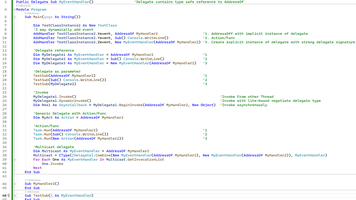
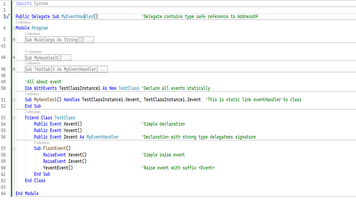
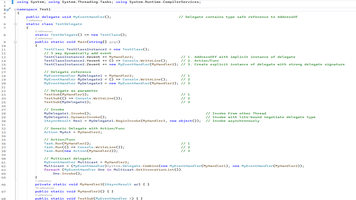
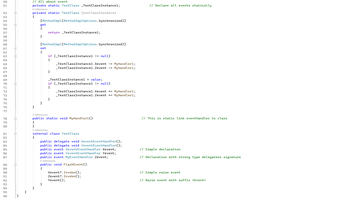
- VB: Events vs Delegates
- VB: Events and delegates
- VB: ?????????????????? StatusLabel ?? ???????????? BackGroundWorker - ?????????????? ???????????????????????? Action, Delegate, Invoke, AddressOf, Extension, Expression.
- VB: Set HandCursor for all ToolStripButton by Linq, Extension, Delegates, Lambda Expression and Anonymous Action.
- VB: How to reorder DataRow with Extension function, Anonymous types, Lambda Expression and Linq Special Row Comparer.
- VB: How to create Razor html-helper in VB.NET
- VB: ???????????????? ?????????????????? ?????? ???????????????????? ?? Linq-?????????????? ?? VB.NET
- VB: ???????????????????????? ???????????????????? ????????????????????????, ????????????????????????, ??????????????????????, ???????????????????? ?? ?????????????????? ???? ???????????????? ?? Visual Basic .NET
- VB: JsonPath more examples.
- VB: EventLogger - example of Task.Factory.FromAsync, Task.Run, ReaderWriterLock, Interlocked.Increment, Stream.BeginWrite, SyncLock, Timeout, AsyncCallback, IAsyncResult, String.Format, Timespan.
- MS Delegates and Events (VB.NET)
Delegate context:
NetCommon context:
Comments (
 )
)
 )
)
Link to this page:
//www.vb-net.com/Delegates/Index.htm
|
|